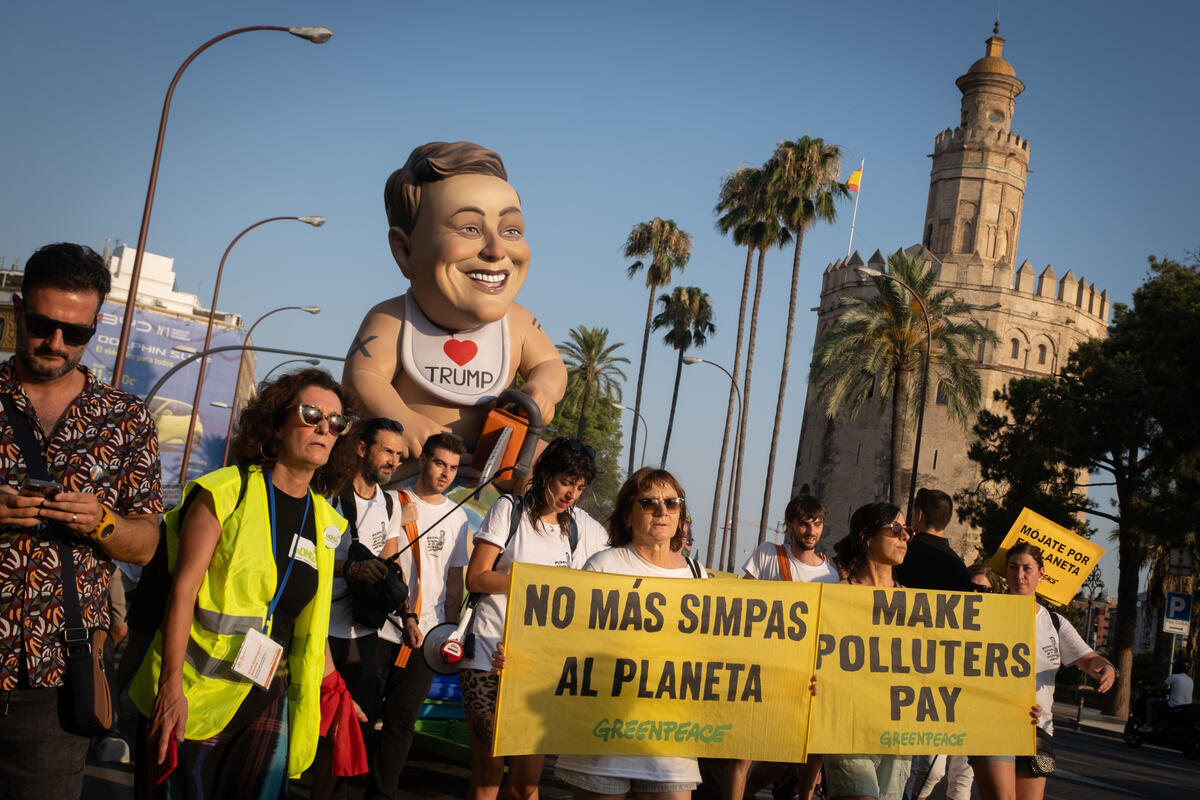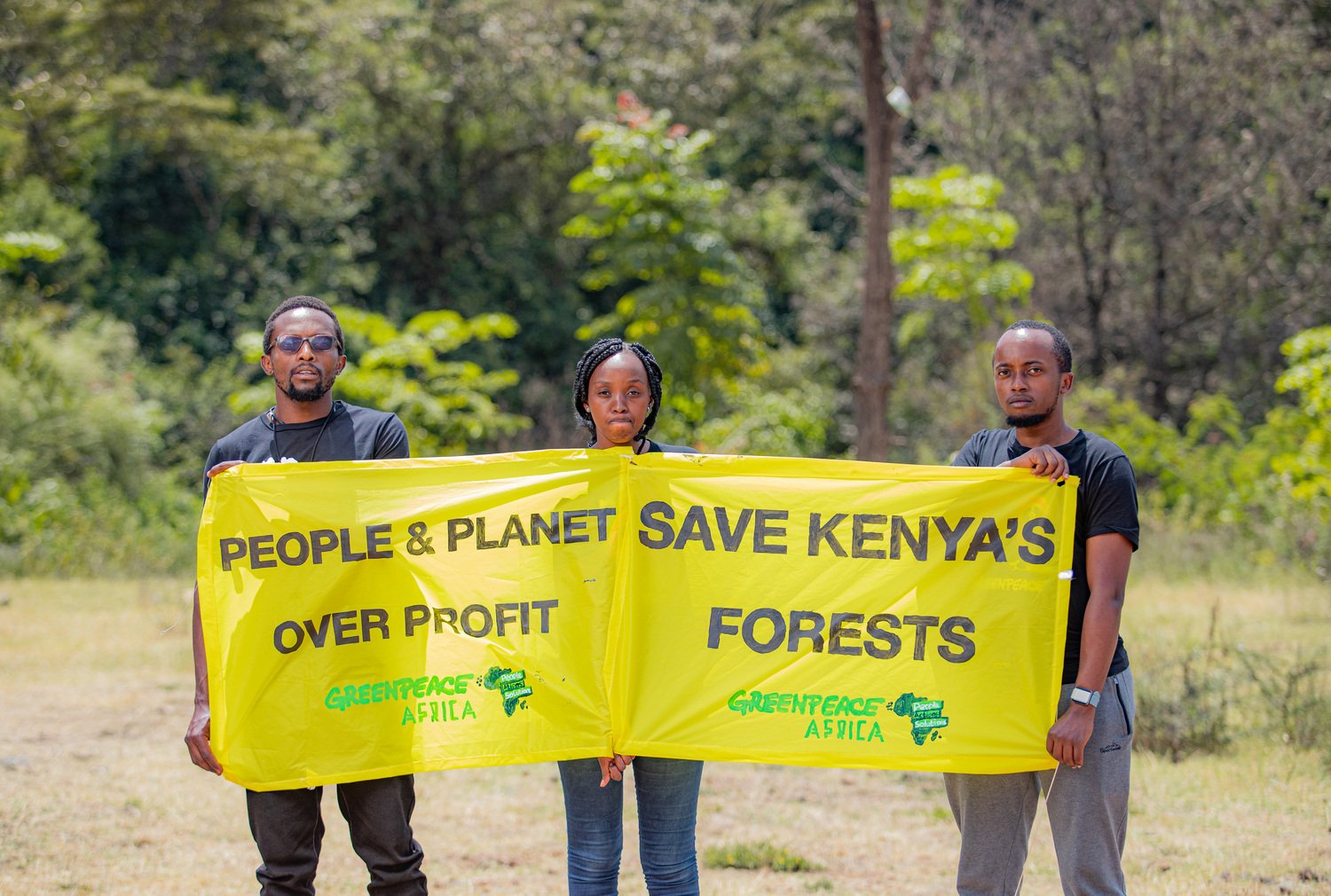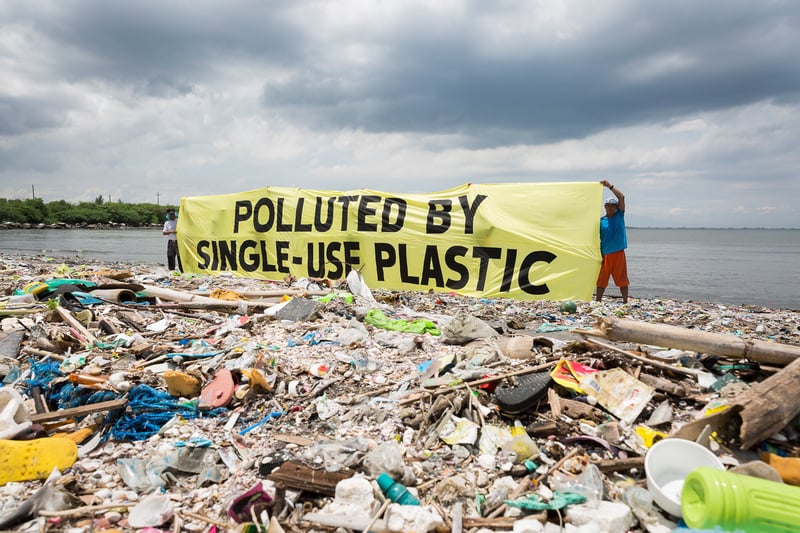Kinshasa, April 3, 2025 – At a time when the planet is facing an unprecedented climate emergency, the Republic of Congo has announced a drastic increase in its oil production. At the Energy and Investment Forum (CEIF), held in Kintélé on March 25 and 26, the government unveiled its ambition to increase national production to 500,000 barrels per day by the end of 2025, almost double the current level. A decision that Greenpeace Africa denounces as a direct threat to the environment, climate commitments and the rights of Indigenous People and local communities.
A risky gamble in the midst of the climate crisis
At a time when experts are warning of the need to reduce dependence on fossil fuels, Congo is opting for the opposite strategy. According to the International Energy Agency (IEA), no new oil projects should see the light of day if the goal of zero net emissions by 2050 is to be achieved. Yet Congo, which currently produces 270,000 barrels/day, is persisting with plans to almost double production in less than a year, a decision that directly contradicts its Nationally Determined Contributions (NDCs) under the Paris Agreement, which call for a 48% reduction in greenhouse gas emissions by 2030, subject to international support.
An ecological disaster in the making
The environmental cost of this expansion would be colossal. The Congo Basin is the world’s second largest tropical rainforest. Stretching over 3.7 million square kilometers and encompassing six countries, this region plays a crucial role in regulating the world’s climate, storing around 30 billion tons of carbon – the equivalent of three years’ global emissions. Oil development threatens this carbon sink and, in particular, the Conkouati-Douli National Park, a UNESCO biosphere reserve that protects over 5,000 square kilometers of terrestrial and marine biodiversity. The park is home to endangered species such as forest elephants, western lowland gorillas, chimpanzees, manatees and three species of marine turtle on the IUCN red list.
The extension of oil blocks on the outskirts of Conkouati-Douli National Park presents a major threat to biodiversity. In addition to fragmenting ecosystems, polluting water resources and accelerating deforestation, this expansion calls into question the Republic of Congo’s international commitments. As a signatory to the Convention on Biological Diversity (CBD) and the Global Framework for Biodiversity, the country has pledged to protect at least 30% of its land and marine areas by 2030 (the “30×30” target). However, by promoting the exploitation of fossil fuels in these sensitive areas, the government is going back on its commitments and setting a worrying precedent for other resource-rich countries.
An underestimated human impact
Beyond the environmental devastation, oil expansion directly threatens the livelihoods of local populations. More than 30,000 people living in and around Conkouati-Douli National Park risk losing access to drinking water, sustainable fishing grounds and resources essential to their survival. Past experience shows that these projects are not without human consequences. In 2024, a Greenpeace Africa mission to Lokolama, DRC, highlighted the devastating effects of oil exploitation: arbitrary detentions, extortion, forced displacement and brutal repression of indigenous voices. Without urgent strengthening of legal safeguards and genuine protection of community rights, these abuses are likely to recur on a massive scale.
The illusion of oil as an engine for development
Congo’s oil expansion is often justified by its low electrification rate, which stands at just 12% in rural areas and 49% in urban areas. But the facts contradict this pseudo-logic: in many countries, the oil industry has never been able to bring affordable energy to the most vulnerable populations. Conversely, renewable energy – led by solar and wind power – offers a faster, more sustainable and, above all, more accessible alternative for isolated communities. According to several studies, every dollar invested in green energy generates three times as many jobs as in fossil fuels. These are all arguments that should weigh heavily in the balance of any country concerned about its long-term economic development.
What about the Congo’s international commitments?
With this expansion, the Congo is in contradiction with several major international agreements:
- The Paris Agreement (2015), which aims to limit global warming to below 1.5°C
- The Convention on Biological Diversity, which requires countries to protect critical habitats
- The United Nations Declaration on the Rights of Indigenous Peoples (UNDRIP), which affirms the right to free, prior and informed consent (FPIC) before any industrial development on ancestral lands
- The Global Biodiversity Framework (2022), which calls for the protection of 30% of land and oceans by 2030.
Greenpeace Africa calls for a change of course
In view of this situation, Greenpeace Africa strongly urges :
- The Congolese government to immediately halt oil exploration and production in protected areas
- Investors and financial institutions to stop financing oil projects in biodiversity hotspots
- The African Union to adopt a firm position in favor of a fair energy transition
- International donors to prioritize support for renewable energy and conservation projects
Dismayed by this latest blow to the fight for climate justice in the Congo Basin, Greenpeace Africa’s Dr. Lamfu Fabrice commented:
“Congo’s attempt to become a fossil fuel hub is irresponsible and short-sighted. It betrays the country’s climate goals, endangers biodiversity and sacrifices the rights and future of its people for immediate gains.”
“As the international community prepares for the upcoming climate talks – COP30, any decisions taken today will weigh heavily on the future of the continent and the world. Now is not the time for promises, but for concrete action”, concluded DR Lamfu.
END
For Media Inquiries, Contact:
Raphael Mavambu, Communication and Media, Greenpeace Africa, [email protected]



